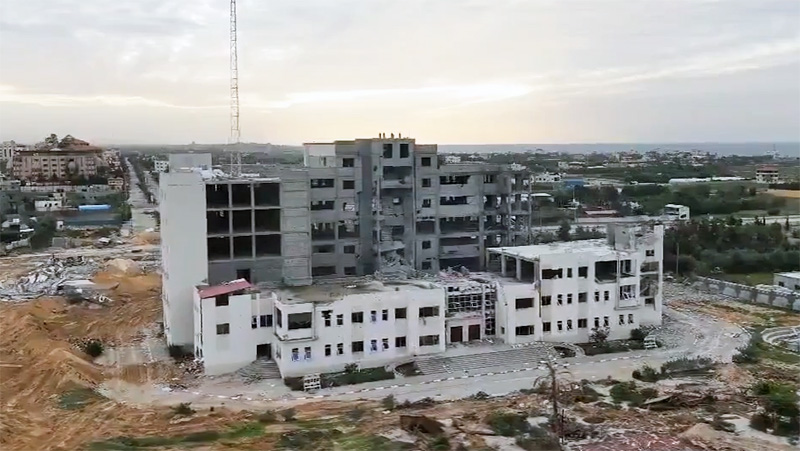
Aslam Fataar, Research Professor in Higher Education Transformation at Stellenbosch University, emphasises the moral duty of South African universities and academic institutions to oppose the systematic destruction of Gaza’s educational system in the ongoing Israeli war on Gaza.
“Scholasticide,” a term coined by Karma Nabulsi, refers to the deliberate destruction of educational institutions and intellectual life as part of a broader genocidal campaign. The Israeli occupation of Palestinian territories has involved targeted attacks on educational infrastructure, the killing and imprisonment of teachers and students, and the systematic erasure of Palestinian cultural and intellectual heritage.
While these assaults have occurred over decades, their intensity in Gaza has escalated since October 2023. Legally, scholasticide has significant implications. Genocide, as defined by the United Nations, includes acts intended to destroy, in whole or in part, a national, ethnic, racial, or religious group. The destruction of educational institutions and targeting of intellectuals are not collateral damage; they are deliberate strategies aimed at erasing the cultural and intellectual existence of the Palestinian people.
This makes the charge of genocide against Israel both plausible and necessary to pursue within international legal frameworks like the International Court of Justice (ICJ). South Africa’s recent move to bring Israel’s actions in Gaza before the ICJ is a crucial step in the global struggle for justice. Drawing from its history, where education was both a tool of oppression and liberation, South Africa is uniquely positioned to lead a global solidarity movement against scholasticide. The apartheid regime sought to limit educational opportunities for Black South Africans, entrenching systemic inequality and repression.
The parallels between apartheid South Africa and the Israeli occupation of Palestine are stark, particularly in the weaponisation of educational systems to maintain control and suppress resistance. The destruction of Gaza’s educational infrastructure has galvanised some South African universities into action. Some university senators, Councils, and academic groups have issued strong statements condemning the attacks, calling for an immediate ceasefire and demanding an end to the occupation. These institutions recognise that an attack on education is an attack on the very foundation of society. Solidarity activities have also been organised on campuses, including pickets, marches, lectures and seminars on the history of the Zionist occupation, the legal implications of Israel’s actions, and the moral imperative to support Palestinian self-determination.
These educational activities are more than symbolic; they are acts of resistance challenging dominant narratives that seek to justify or obscure the realities of the occupation. Moreover, these actions are bolstered by a broader academic movement that includes the boycott of Israeli academic institutions complicit in the occupation, the promotion of scholarships and research focused on Palestinian issues, and partnerships with Palestinian universities to support their reconstruction efforts.
These initiatives underscore the importance of international solidarity in the struggle for educational justice in Palestine. Students play a vital role in the South African solidarity movement, drawing inspiration from the resilience of the Palestinian people. Solidarity student organisations have been instrumental in organising protests and awareness campaigns to support the reconstruction of Gaza’s educational infrastructure. Their efforts, often coordinated with international student solidarity groups, amplify their activism and empower them to make a tangible difference.
The involvement of students in this movement is particularly significant, given the parallels between their experiences and those of young Palestinians. Many South African students are products of a post-apartheid educational system that, despite its challenges, represents a hard-won victory over racial oppression. Their participation in the solidarity movement reaffirms the inherent dignity of young Palestinian lives and reflects the vital role of education in the struggle for freedom and justice.
The South African solidarity movement is part of a broader global network supporting the Palestinian cause. This network includes pro-Palestinian Jews, Christians, Muslims, workers, and other community groups who tirelessly organise campaigns to raise awareness and build support for Palestinian self-determination. International solidarity movements have been crucial in highlighting scholasticide on the global stage. They have provided platforms for Palestinian voices, facilitated the exchange of ideas and strategies, and pressured governments and international organisations to take concrete action against Israel’s actions in Gaza.
The ṣumūd (resilience and steadfastness) of the Palestinian people, who have persevered through decades of occupation, has profoundly impacted South African solidarity activism. Despite immense challenges, Palestinians continue to prioritise education, recognising it as a vital tool in their struggle for freedom and self-determination. This ṣumūd inspires South African solidarity activists, reinforcing the importance of education as a means of empowerment and resistance.
It underscores the moral imperative to support the Palestinian people in their fight against scholasticide. The South African solidarity movement is not just about opposing the destruction of Gaza’s educational infrastructure; it is about standing with a people who, despite unimaginable adversity, continue to fight for their right to exist, learn, and thrive. The struggle against scholasticide in Gaza is a moral imperative demanding active participation from South African universities, academics, and students. In doing so, they honour the resilience of the Palestinian people and reaffirm their shared commitment to justice, freedom, and human dignity.


